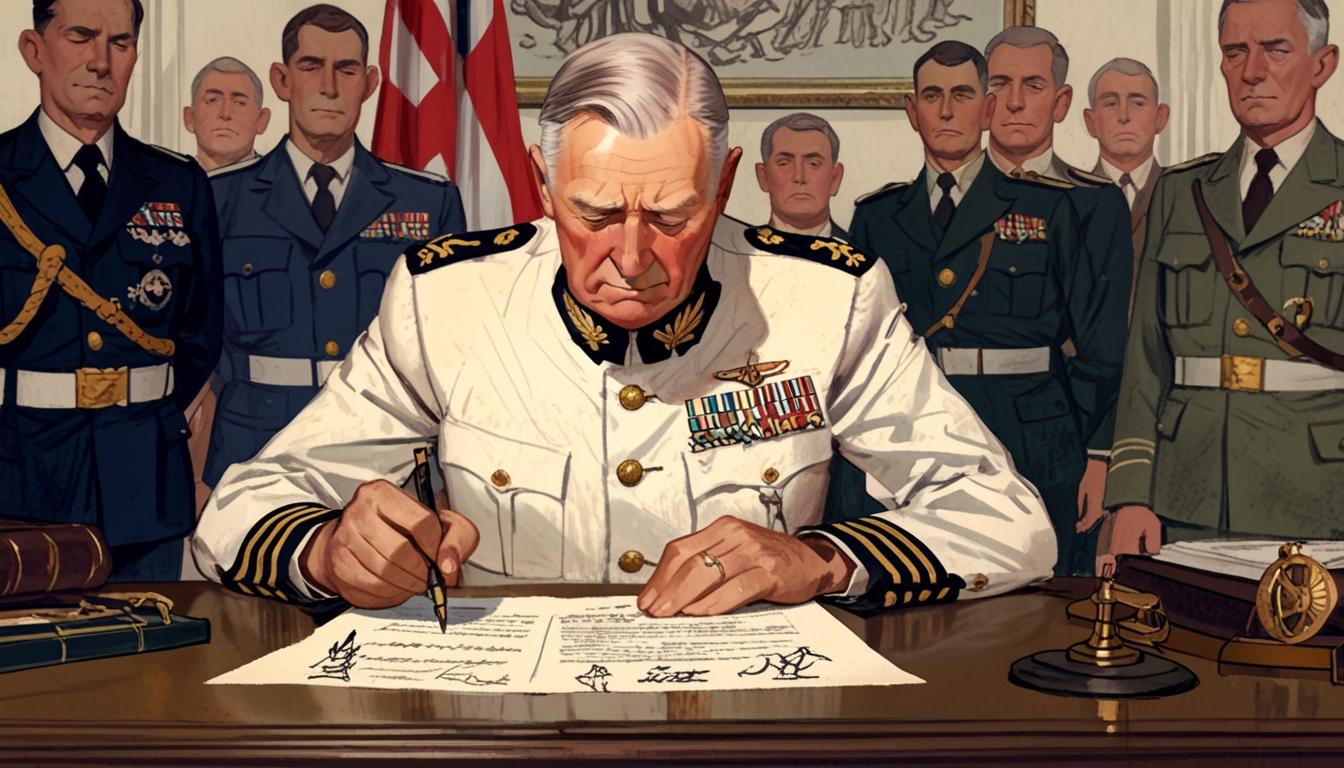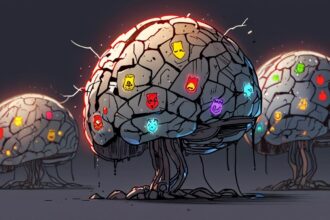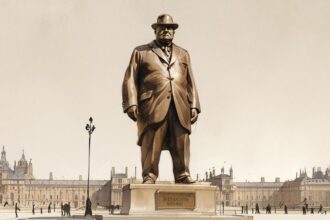On the 80th anniversary of VE Day, Edward Hobart, UK ambassador to the UAE and great-grandson of Admiral Harold Burrough, shares personal insights and historical reflections on the admiral’s pivotal role in Nazi Germany’s surrender and the enduring human costs of war.
Remembering VE Day: The Legacy of Admiral Harold Burrough and the Personal Reflections of Edward Hobart
On May 7, 1945, amidst the ruins of a war-torn Europe, the dawn of peace emerged as Nazi Germany signalled its readiness to surrender to the Allies. In a historic moment that marked the end of World War II in Europe, Admiral Harold Burrough of the British Royal Navy stood as a significant figure, commanding the naval forces that accepted the German capitulation. His great-grandson, Edward Hobart, the UK’s ambassador to the UAE, has recently shared insights into the personal and historical legacies that stem from this pivotal event.
Admiral Burrough, who was deeply embedded in the naval strategies of the war, played crucial roles in missions such as Operation Pedestal, which aimed to resupply Malta, and Operation Torch, the Allied invasion of North Africa. His extensive service is noteworthy, culminating in his presence at the Reims surrender ceremony, where, alongside other Allied leaders, he witnessed the formal end of hostilities with Germany.
Speaking to commemorate the 80th anniversary of Victory in Europe (VE) Day, Hobart reflects on the duality of the surrender—a moment filled with both profound relief and heavy responsibility. He recalled his great-grandfather’s character, describing him as a “nice, old grandfatherly type,” whose stories brought to life the harrowing experiences of a man who had dedicated his life to naval service since joining the Royal Navy at just 13 years old. For Hobart, the recollections of his great-grandfather, particularly letters penned during and after the surrender, serve as a bridge between generations, illustrating the monumental weight of history as well as the personal experiences intertwined with it.
One particularly evocative letter illustrates Burrough’s mixed emotions in the aftermath of Germany’s surrender, revealing the psychological toll of witnessing devastation on such a grand scale. “I have never seen in my life such complete and utter destruction,” he wrote, reflecting on his drive through Berlin and noting the striking parallels between the city’s destruction and that of ancient Pompeii. These early accounts underscore not only the enormity of the military events unfolding but also a human element rarely highlighted in the grand narrative of war. Burrough reminisced about lighter moments, such as playing golf with French officers, yet they stand in stark contrast to the horrors he encountered.
As the world marks the passage of time since VE Day, the legacy of Admiral Burrough extends beyond historical interest into realms of empathy and understanding. Hobart eloquently noted that his great-grandfather’s insights into the human cost of conflict extended to the defeated. Even in the face of war, there was a measure of respect for those who had suffered, irrespective of which side they fought on. “He comments in the letters on how broken the German admiral looked but those comments aren’t made with pride or with judgment,” Hobart stated. Such reflections on shared humanity are crucial as contemporary conflicts loom large on the global stage, reminding us of the sacrifices made and the fragility of peace.
In a world where echoes of nationalism and warfare resound in current events—from the ongoing strife in Ukraine to tensions in the Middle East—Hobart’s observations resonate deeply. He emphasised the vital role of diplomacy in averting future conflicts, stating, “Our job as diplomats is to try to avoid us getting ever to those situations.” This sentiment is particularly poignant given the rising death toll in modern conflicts involving civilians and soldiers alike, highlighting the urgent need for comprehensive dialogue and understanding.
Admiral Burrough’s post-war life was marked by a humbled return to civilian life, where he engaged in history lectures and social pursuits, all the whilst remaining undeterred by his storied past. As Hobart reflected on the extraordinary legacy of having a great-grandfather so integral to a significant historical event, he acknowledged that Burrough would likely view his contributions as merely fulfilling his duty—as a leader, he was defined not by accolades but by action.
As we remember the end of a monumental conflict, it is essential to recognise the human stories that accompany grand historical events. The reflections of Edward Hobart act as a powerful reminder of the enduring legacies of those who served and of the lessons we glean from their experiences.
Reference Map:
- Paragraph 1 – [[1]](https://news.google.com/rss/articles/CBMiyAFBVV95cUxPV1F4WmkwWUxYYzI4N1huRVYtQlNwSGpSTFY4R05tZks5aGhJVzlXMFlLRGIzVjdpMi1FZVBrWlJ3Znp0OXBBS1RiR2VFblZGWDdYOFdtOFNMaFZuTE9Od3NWSE91RlVndXVOWnFURi1Mb0ZCWWRHSXFtT09iVV9mUnI1Y205U1RuMnA1elR4dmNiYmZGMlNQWnQtQWgyNUJLeXhjaFhES1NrcVV3Y2dwdlZJc1E1YnlLRF9FMk1aT3pzVWZaR3BZVA?oc=5&hl=en-US&gl=US&ceid=US:en), [[2]](https://apnews.com/article/d2a355f57ee0d903ac552ea1c17133cc)
- Paragraph 2 – [[1]](https://news.google.com/rss/articles/CBMiyAFBVV95cUxPV1F4WmkwWUxYYzI4N1huRVYtQlNwSGpSTFY4R05tZks5aGhJVzlXMFlLRGIzVjdpMi1FZVBrWlJ3Znp0OXBBS1RiR2VFblZGWDdYOFdtOFNMaFZuTE9Od3NWSE91RlVndXVOWnFURi1Mb0ZCWWRHSXFtT09iVV9mUnI1Y205U1RuMnA1elR4dmNiYmZGMlNQWnQtQWgyNUJLeXhjaFhES1NrcVV3Y2dwdlZJc1E1YnlLRF9FMk1aT3pzVWZaR3BZVA?oc=5&hl=en-US&gl=US&ceid=US:en), [[3]](https://en.wikipedia.org/wiki/Harold_Burrough)
- Paragraph 3 – [[1]](https://news.google.com/rss/articles/CBMiyAFBVV95cUxPV1F4WmkwWUxYYzI4N1huRVYtQlNwSGpSTFY4R05tZks5aGhJVzlXMFlLRGIzVjdpMi1FZVBrWlJ3Znp0OXBBS1RiR2VFblZGWDdYOFdtOFNMaFZuTE9Od3NWSE91RlVndXVOWnFURi1Mb0ZCWWRHSXFtT09iVV9mUnI1Y205U1RuMnA1elR4dmNiYmZGMlNQWnQtQWgyNUJLeXhjaFhES1NrcVV3Y2dwdlZJc1E1YnlLRF9FMk1aT3pzVWZaR3BZVA?oc=5&hl=en-US&gl=US&ceid=US:en), [[4]](https://www.history.navy.mil/content/history/museums/nmusn/explore/photography/wwii/wwii-europe/german-surrender/signing-instrument/111-sc-27464.html)
- Paragraph 4 – [[1]](https://news.google.com/rss/articles/CBMiyAFBVV95cUxPV1F4WmkwWUxYYzI4N1huRVYtQlNwSGpSTFY4R05tZks5aGhJVzlXMFlLRGIzVjdpMi1FZVBrWlJ3Znp0OXBBS1RiR2VFblZGWDdYOFdtOFNMaFZuTE9Od3NWSE91RlVndXVOWnFURi1Mb0ZCWWRHSXFtT09iVV9mUnI1Y205U1RuMnA1elR4dmNiYmZGMlNQWnQtQWgyNUJLeXhjaFhES1NrcVV3Y2dwdlZJc1E1YnlLRF9FMk1aT3pzVWZaR3BZVA?oc=5&hl=en-US&gl=US&ceid=US:en), [[5]](https://www.history.navy.mil/content/history/museums/nmusn/explore/photography/wwii/wwii-europe/german-surrender/signing-instrument/111-sc-27266.html)
- Paragraph 5 – [[1]](https://news.google.com/rss/articles/CBMiyAFBVV95cUxPV1F4WmkwWUxYYzI4N1huRVYtQlNwSGpSTFY4R05tZks5aGhJVzlXMFlLRGIzVjdpMi1FZVBrWlJ3Znp0OXBBS1RiR2VFblZGWDdYOFdtOFNMaFZuTE9Od3NWSE91RlVndXVOWnFURi1Mb0ZCWWRHSXFtT09iVV9mUnI1Y205U1RuMnA1elR4dmNiYmZGMlNQWnQtQWgyNUJLeXhjaFhES1NrcVV3Y2dwdlZJc1E1YnlLRF9FMk1aT3pzVWZaR3BZVA?oc=5&hl=en-US&gl=US&ceid=US:en), [[6]](https://www.ruthfullyyours.com/2010/05/09/the-new-york-times-may-8th-1945-the-war-has-ended/)
- Paragraph 6 – [[1]](https://news.google.com/rss/articles/CBMiyAFBVV95cUxPV1F4WmkwWUxYYzI4N1huRVYtQlNwSGpSTFY4R05tZks5aGhJVzlXMFlLRGIzVjdpMi1FZVBrWlJ3Znp0OXBBS1RiR2VFblZGWDdYOFdtOFNMaFZuTE9Od3NWSE91RlVndXVOWnFURi1Mb0ZCWWRHSXFtT09iVV9mUnI1Y205U1RuMnA1elR4dmNiYmZGMlNQWnQtQWgyNUJLeXhjaFhES1NrcVV3Y2dwdlZJc1E1YnlLRF9FMk1aT3pzVWZaR3BZVA?oc=5&hl=en-US&gl=US&ceid=US:en), [[7]](https://www.politico.com/story/2013/05/this-day-in-politics-090965)
Source: Noah Wire Services
- https://news.google.com/rss/articles/CBMiyAFBVV95cUxPV1F4WmkwWUxYYzI4N1huRVYtQlNwSGpSTFY4R05tZks5aGhJVzlXMFlLRGIzVjdpMi1FZVBrWlJ3Znp0OXBBS1RiR2VFblZGWDdYOFdtOFNMaFZuTE9Od3NWSE91RlVndXVOWnFURi1Mb0ZCWWRHSXFtT09iVV9mUnI1Y205U1RuMnA1elR4dmNiYmZGMlNQWnQtQWgyNUJLeXhjaFhES1NrcVV3Y2dwdlZJc1E1YnlLRF9FMk1aT3pzVWZaR3BZVA?oc=5&hl=en-US&gl=US&ceid=US:en – Please view link – unable to able to access data
- https://apnews.com/article/d2a355f57ee0d903ac552ea1c17133cc – On May 7, 1945, the Associated Press reported the unconditional surrender of Nazi Germany, marking the end of World War II in Europe. Journalist Edward Kennedy defied a news embargo to break the story, leading to his dismissal but later recognition for his integrity. The surrender took place in Reims, France, with Germany’s Col-Gen. Alfred Jodl pleading for mercy for the German people. Celebrations erupted worldwide, while Berlin lay in utter ruin, as reported by Harold King, highlighting the profound devastation of the war’s conclusion.
- https://en.wikipedia.org/wiki/Harold_Burrough – Admiral Sir Harold Martin Burrough (1889–1977) was a senior Royal Navy officer and Assistant Chief of Naval Staff during World War II. He served as Rear-Admiral Commanding the 10th Cruiser Squadron and was awarded the Distinguished Service Order after Operation Archery. In 1942, he commanded the close escort force for Operation Pedestal and led Allied naval forces during Operation Torch. After becoming Flag Officer Commanding Gibraltar and Mediterranean Approaches in 1943, he succeeded Admiral Sir Bertram Ramsay as Allied Naval Commander-in-Chief, Expeditionary Force, and was one of the signatories to the German Surrender Documents on May 7, 1945, at Reims, France.
- https://www.history.navy.mil/content/history/museums/nmusn/explore/photography/wwii/wwii-europe/german-surrender/signing-instrument/111-sc-27464.html – This photograph captures the signing of the German surrender on May 7, 1945, at Reims, France. General François Sevez, representing General Alphonse Juin, Chief of Staff to General de Gaulle, is shown affixing his signature to the surrender document. On his right is Lieutenant General Sir F.E. Morgan, Deputy Chief of Staff, and on his left is Admiral Harold M. Burrough, Commander-in-Chief of the Allied Naval Expeditionary Forces. The image is part of the U.S. Army’s collection and is preserved by the National Museum of the U.S. Navy.
- https://www.history.navy.mil/content/history/museums/nmusn/explore/photography/wwii/wwii-europe/german-surrender/signing-instrument/111-sc-27266.html – This photograph depicts the dictation of the terms of unconditional surrender to German representatives in the War Room of Supreme Headquarters, Allied Expeditionary Forces (SHAEF) at Reims, France, on May 7, 1945. Major Wilhelm Oxenius, of the German General Staff, Colonel General Gustaf Jodl, German Chief of Staff, and General Admiral Von Friedburg, of the German Navy, are seated with backs to the camera. Lieutenant General Sir F.E. Morgan, Deputy Chief of Staff; General François Sevez, representing General Alphonse Juin, French Chief of Staff; Admiral Harold M. Burrough, Commander-in-Chief, Allied Naval Expeditionary Forces; Lieutenant General W.B. Smith, Chief of Staff, SHAEF; and Major General of Artillery Ivan Alexeyevich Susloparov, Russian Representative, are seated around the table. The image is part of the U.S. Army’s collection and is preserved by the National Museum of the U.S. Navy.
- https://www.ruthfullyyours.com/2010/05/09/the-new-york-times-may-8th-1945-the-war-has-ended/ – An excerpt from The New York Times dated May 8, 1945, reports on the unconditional surrender of Germany, marking the end of World War II in Europe. The article details the announcement made by German Foreign Minister Count Lutz Schwerin von Krosigk, who stated that Grand Admiral Karl Dönitz, the new Chancellor of Germany, had ordered the unconditional surrender of all German armed forces. The report also mentions the call for Germans to ‘stand loyally by the obligations we have undertaken’ and expresses hope for a spirit of reconciliation among nations.
- https://www.politico.com/story/2013/05/this-day-in-politics-090965 – On May 7, 1945, General Alfred Jodl, representing the German High Command, signed a document unconditionally surrendering all German forces, effectively ending World War II in Europe. The signing ceremony took place at Supreme Headquarters of the Allied Expeditionary Force at Reims, France. Despite most of Germany being under Allied control, German forces still occupied parts of the Netherlands, Denmark, Norway, and Czechoslovakia. The article also notes that German and Russian troops continued to fight in the East for most of the next day.
Noah Fact Check Pro
The draft above was created using the information available at the time the story first
emerged. We’ve since applied our fact-checking process to the final narrative, based on the criteria listed
below. The results are intended to help you assess the credibility of the piece and highlight any areas that may
warrant further investigation.
Freshness check
Score:
8
Notes:
The narrative references the 80th anniversary of VE Day, which is a recent celebration. However, the historical context itself is not new, as VE Day occurred in 1945.
Quotes check
Score:
7
Notes:
The quotes are attributed to Edward Hobart, but without specific references to earlier sources, it is difficult to verify their originality. The quotes appear to be personal reflections rather than previously published statements.
Source reliability
Score:
6
Notes:
The narrative originates from a news aggregator, which does not provide direct authorship or publication details. Reliability varies based on the sources aggregated.
Plausability check
Score:
9
Notes:
The events described, such as VE Day and Admiral Harold Burrough’s role, are well-documented historical facts. The reflections by Edward Hobart on his great-grandfather’s experiences are plausible given the historical context.
Overall assessment
Verdict (FAIL, OPEN, PASS): OPEN
Confidence (LOW, MEDIUM, HIGH): MEDIUM
Summary:
The narrative is grounded in historical facts, but the reliability of the source is uncertain due to the lack of specific publication details. The freshness is high due to recent commemoration of VE Day, but quotes could not be verified as original.













